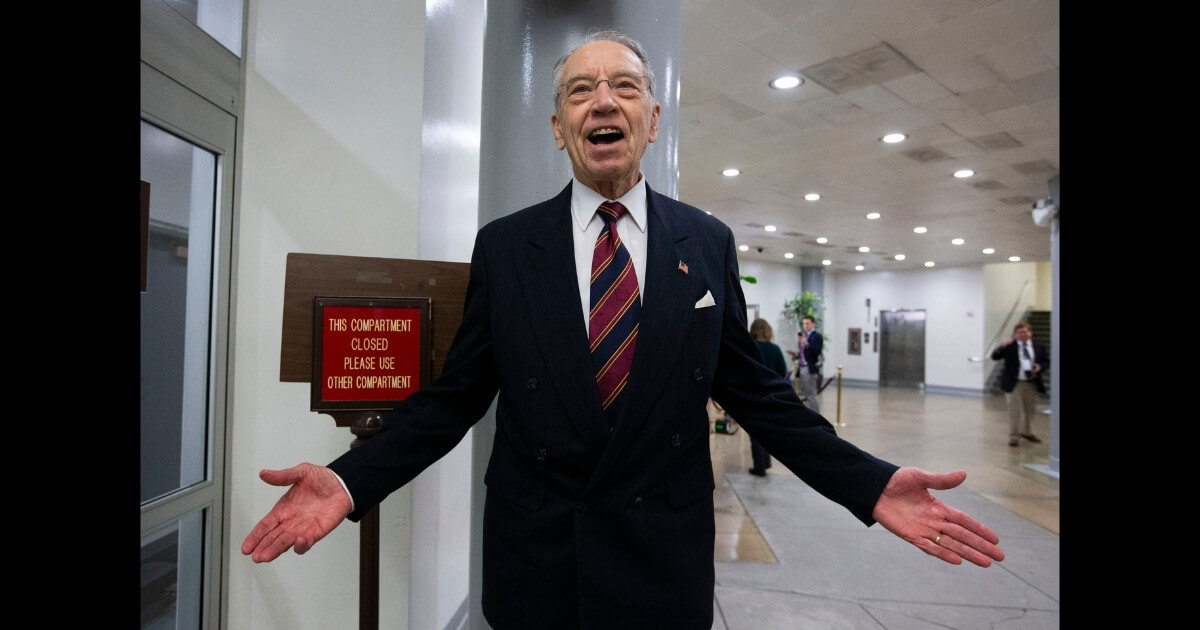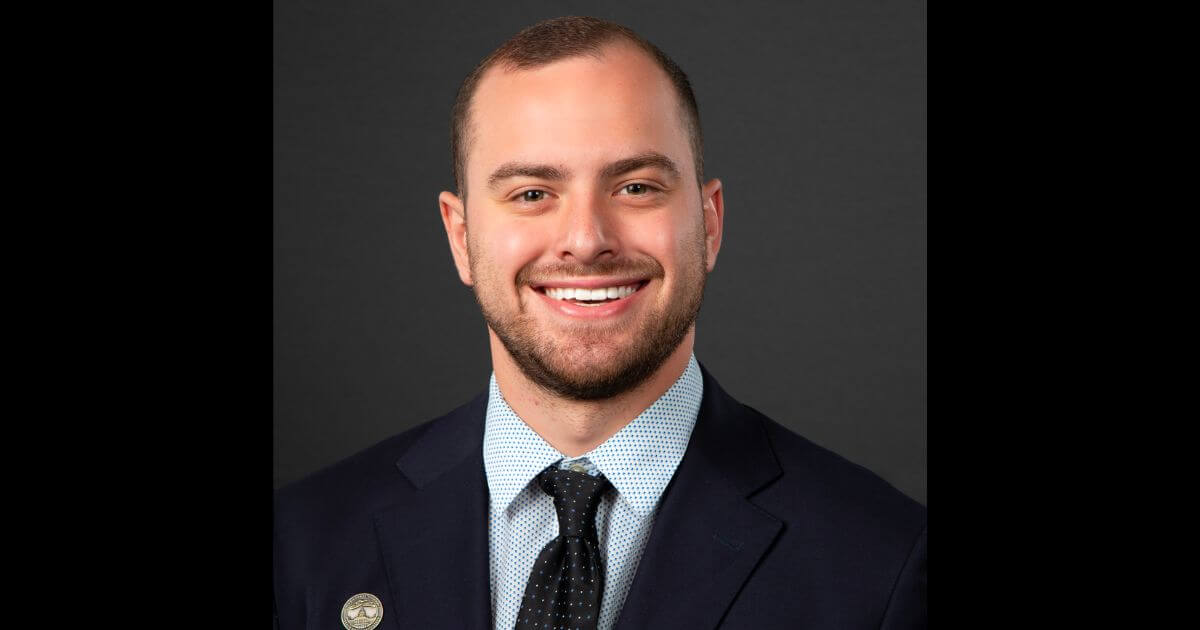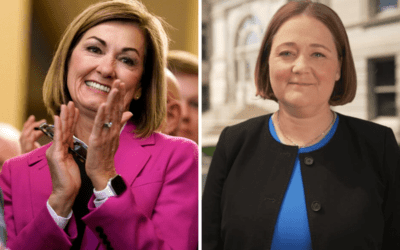
AP Photo/Jose Luis Magana
For years, Sen. Chuck Grassley has been an outspoken voice in Congress against pharmaceutical drug pricing and “Big Pharma” while also accepting about $1.4 million in donations from the industry throughout his senate career.
However, Grassley had a recent opportunity to cap the cost of insulin at $35 a month—nearly three times lower than the average cost of the life-saving drug—in the Inflation Reduction Act of 2022.
Instead, Grassley and most other Senate Republicans including Joni Ernst voted against a Democratic measure, which fell three votes short of the 60 votes necessary to get a private insurance insulin price cap to be included in the final version of the bill.
[inline-ad id=”0″]
One of Grassley’s defenses was that he voted for a far less impactful amendment that—
Are you sure he voted against a $35 insulin cap?
Umm, hello. Yes, I’m sure.
But he tweeted that he “voted 2 make insulin available 4 pennies on the dollar 2 uninsured & w high deductible plans but Dems blocked it.”
I voted 2 make insulin available 4 pennies on the dollar 2 uninsured & w high deductible plans but Dems blocked it
— Chuck Grassley (@ChuckGrassley) August 7, 2022
See, that’s what I was getting ready to explain before you interr—
[inline-ad id=”1″]
Then what was Grassley talking about?
So Grassley and other Iowa Republicans in Congress have gotten into the habit of introducing and supporting stripped-down versions of bills that are generally perceived to be popular with voters. This gives them a chance to tell their constituents “Aww shucks, I tried” while also avoiding giving Democrats a win.
But isn’t being in Congress about helping people in your home state?
Oh, my sweet summer child.
OK, so why did Grassley say he voted to lower insulin costs?
So Grassley and every other Republican in the Senate—that body of Congress is split 50-50 between Republicans and Democrats—voted for an amendment by Sen. John Kennedy (R-Louisiana) that was introduced on Aug. 6. Grassley’s claim is based on the vote.
What did Kennedy’s amendment do exactly?
According to the text from the amendment, $3.1 billion would be redirected from the US Treasury “for making payments to federally-qualified health centers for purposes of covering direct costs incurred by “such centers for making discounted insulin and epinephrine available to qualifying center patients, as described in subsection (b).”
That doesn’t sound bad! What’s the issue?
Well, there are a few. For starters, you have to meet certain criteria to be a “qualifying center patient” to even get the discounted insulin under Kennedy’s amendment. You have to qualify as a patient at a federal clinic AND have an income equal to less than the 350% of the federal poverty level; have a high unmet deductible under a health insurance plan, or have no health insurance.
That doesn’t seem to cover a lot of people, but getting some people cheaper insulin seems better than nothing, right?
So there are nearly 1,400 federal health clinics in the US—96 are in Iowa—and they serve about 30 million Americans annually. But, there are about 37.3 million Americans—232,000 of whom are Iowans—with diabetes, according to the Centers for Disease and Control. So there could still be millions, if not tens of millions, of Americans who would still be price-gouged for insulin under the Republican plan. But, to be fair, there are also about 28 million Americans without health insurance out there, so the diabetics among that group could benefit from the discounted insurance.
If you’re looking for a simple bottom-line here, it’s this: Senate Democrats wanted to cap insulin prices for everyone, while Republicans only wanted a fraction of people on private insurance to have set-price insulin.
[inline-ad id=”2″]
So what happened with the Kennedy amendment?
Democrats didn’t support it because they didn’t think it covered a wide enough swath of Americans (see my above response) so it stalled out.
I saw that the Senate did approve the Inflation Reduction Act on Sunday, but did it include anything about insulin?
Yes, the final version does include a provision to cap insulin at $35 for Medicare patients (Grassley also voted against this and Vice President Kamala Harris provided the tie-breaking vote to advance it). For overly-complicated reasons of how “reconciliation” works in the Senate, Democrats only needed 50 votes to get Medicare patients covered, but needed 60 for those with private insurance or no insurance.
If you like numbers, there are about 60 million Americans on Medicare and about 211 million who have a form of private insurance.
Before the final vote, did Democrats make another attempt to lower insulin costs for non-Medicare patients?
Yes. This was the measure I spoke of above that fell three votes short of passing. Seven Republican senators including Kennedy—you know, of the Kennedy amendment Grassley is using as a shield—voted to keep the $35 insulin cap in place for private insurance but it needed 60 votes to survive.
You can even watch Grassley vote against it.
you also voted no here https://t.co/HNB7AJ8ouA pic.twitter.com/S8eHSh3F0v
— Acyn (@Acyn) August 7, 2022
[inline-ad id=”3″]
But I thought Grassley blamed that on parliamentary rules.
Ah, this is where Grassley hopes you’re not paying attention. Again, through that reconciliation process, the Senate parliamentarian can rule part of the bill an “extraneous matter.” But senators can also take a vote where they essentially say, “Eh, we don’t agree with that ruling, this is too important.”
And that’s what happened, Democrats called a vote but it came up three votes short because it requires 60 votes to overrule. It very well could have passed—even seven Republicans voted with Democrats to expand the insulin cap. But Grassley voted against it.
Parliamentarian nixed Dems price cap bc it didn't follow budget rule Vote on the cap was not abt insulin It was abt Dems ignoring budget rules Dear colleagues join me in supporting the Collins-Shaheen bill to cap insulin at $35 & enact PBM reforms in bipartisan way
— Chuck Grassley (@ChuckGrassley) August 8, 2022
And in fact, if we did take Grassley’s explanation at face value here, what he’s essentially saying is that an arcane Senate rule mattered more to him than capping the cost of a life-saving drug for millions of Americans.
Geez. Has Grassley at least explained why he voted against lowering insulin costs?
Kind of? He issued a statement Sunday saying that the Inflation Reduction Act was a “partisan bill, written behind closed doors without any input from Republicans, will raise taxes, cut jobs, kill cures and fuel inflation—all at the worst possible time.”
But did he address the insulin issue specifically?
At the bottom of his statement, Grassley talked about his past efforts to lead bipartisan prescription drug reform. He also championed his own bill, the “Prescription Drug Pricing Reduction Act of 2020,” which died in Congress without ever receiving a vote.
So Chuck Grassley voted against lowering insulin prices in every way possible over the weekend?
With the exception of the Kennedy amendment that was never going to advance, that would be correct. Chuck Grassley voted against lowering the cost of insulin.
by Ty Rushing
08/11/22
To contact Senior Editor Ty Rushing for tips or story ideas, email him at [email protected] or find him on Twitter @Rushthewriter
Iowa Starting Line is part of an independent news network and focuses on how state and national decisions impact Iowans’ daily lives. We rely on your financial support to keep our stories free for all to read. You can contribute to us here. Also follow us on Facebook and Twitter.
[inline-ad id=”0″]

Lanon Baccam wins 3rd District Dem primary, will face Zach Nunn
Baccam defeats Melissa Vine to challenge Republican incumbent Lanon Baccam defeated Melissa Vine in Tuesday’s Democratic primary for Iowa’s 3rd...

Hardin County man running for office as Trump-loving Democrat to local party’s dismay
Brad Rewoldt, who recently changed his party affiliation from Republican, says his support of Trump will probably 'piss off' Democrats There is a...

Scheetz: Tax cuts for all Iowans, not just the wealthy
State Rep. Sami Scheetz says all Iowans should benefit from tax cuts via a sales tax reduction As a state representative, my job is to serve the...

Kalbach: What Iowa Republicans focused on during legislative session
Our state legislative session finished up towards the end of April, and I’m glad it’s over! From further de-funding and privatizing our public...

Advocates file suit to stop Iowa’s ‘unconstitutional’ immigration law
Immigration advocates filed a federal lawsuit Thursday to stop Iowa’s new immigration law—SF 2340—from taking effect arguing that the legislation...

Iowa Republicans make outlawing gay marriage key 2024 campaign priority
Iowa Republicans have made outlawing gay marriage a key goal in their 2024 party platform. During the Iowa GOP’s 2024 state convention on Saturday,...





